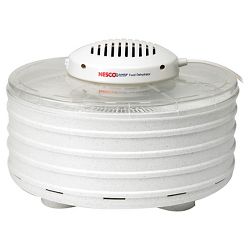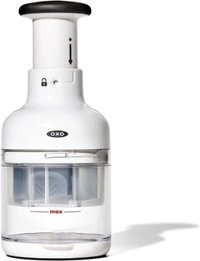The foodie has been on extended foodie hiatus, but he’s back with this handy article about preserving your hot chili harvest (or any foodstuff, really) through the magic of DEHYDRATION!
Dehydrating hot peppers is one of my staple activities for ensuring that I can always make a hot sauce when I feel the need.
If you were wondering how to dry hot peppers from the garden, then this is your lucky day!
Dehydrating is a great way to preserve your produce for future benefit, if such produce lends itself to dehydration.
Hot chilis (peppers), tomato slices, some fruits, and even some meats like chicken or beef, can be dehydrated for the future.
I have come across many people and other hot pepper enthusiasts who tend to either pickle or freeze their harvest.
I never could understand it.
Freezer space is at a premium, and the food gets damaged over time if you don’t use it in a reasonable amount of time.
Pickling is good for some things, but that’s double work if you eventually plan to make hot sauce.
Also, pickling isn’t always good, depending on the final application for the produce.
Dehydrating hot peppers is the answer for chili head gardeners, or even those who get a good price on a bulk of hot chilis from the market.
I have had a box of bagged dehydrated hot peppers at my disposal for several years.
I am still pulling dehydrated hot peppers out of that stash from about 5 years ago.
If I get new ones, I just bag and date the suckers and add them to the stash.
Yes, it’s THAT easy!
All you need for this is a cheap food dehydrator.
So, as far as dehydrator reviews goes, I’d say that any decent brand will do, because all these things are are slow cook devices using hot air convection via a heating filament at the bottom, and a fan.
Dehydrating food recipes can be drying any foodstuff that lends itself to drying, and mostly people do this with meats and produce.
Dehydrating jalapeno peppers and dehydrating habanero peppers are very easy, but I’ve used mine mostly for the very hot varieties that I grow in our garden, namely ghost peppers, Trinidad Scorpions and 7 Pots, Morugas, brain strains, chocolate douglahs, and Carolina Reaper.
The produce comes out crispy and dry.
When it comes to dehydrating hot peppers, you can bag them and save for hot sauce and other recipes, and even crush them up in a suitable shaker container for use on pasta and other dishes that can use spice but don’t lend well to a hot sauce.
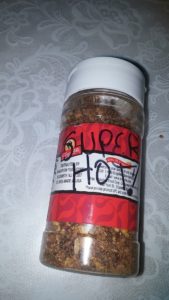
Just be careful if you’re using the super hot chili varieties that I mention above.
If you use as much as you do of the supermarket hot pepper flakes, you’ll be in a world of hurt.
A little goes a LONG way!
So you just lay out the peppers on the top rack if they’re bulky.
The lower tiers are for the flat or cut up stuff.
Here are some photos of my evil super hot peppers in the food dehydrator.
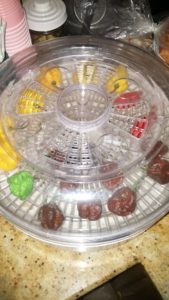
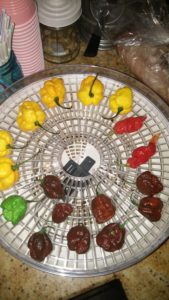
They just shrivel and dry up. I don’t have any of those pics on hand, and I will add them when I track them down.
So there you have it!
Dehydrate hot peppers or your other produce to preserve it for future use!
The Looney Foodie strikes again!

